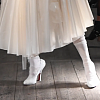
We form the salary of sellers: expert advice

“How do you charge your consultants for personal or general sales?” Is one of the most popular questions causing a lot of controversy and gossip on the online forums of retail business owners. Indeed, how to properly form the earnings of sellers? But what about bonuses, where to get a sales plan from, do employees allow them to buy goods at discounted stores? In search of truth, the Shoes Report turned to a dozen shoe retailers, but no company wanted to disclose its motivation system - the process of its development was too complicated and individual. Then we asked four business consultants, and finally became convinced that the topic of seller motivation is very complex, because even our experts could not come to a common opinion.
Recommendations were given:
 Julia Veshnyakova - General Director of the consulting company "Academy of Retail Technologies", a practicing specialist in the procurement of a collection of fashionable clothes and accessories at specialized exhibitions. Practical experience in the fashion industry - 19 years. www.art-rb.ru
Julia Veshnyakova - General Director of the consulting company "Academy of Retail Technologies", a practicing specialist in the procurement of a collection of fashionable clothes and accessories at specialized exhibitions. Practical experience in the fashion industry - 19 years. www.art-rb.ru Anya Pabst - Head of the Russian branch of BEITRAINING. Master of Sociology and Slavic Studies. Education "HR Manager", is a specialist in the field of crisis communication. He has experience working with people in study groups of various profiles both in Germany and abroad. Over the years, Anya Pabst has trained over 150 trainers. For more than 7 years her professional activity has been associated with work in the CIS countries - Russia, Kazakhstan and Ukraine. BEITRAINING is an international franchise company and a certified strategic partner of the German and Austrian Franchising Union on the topic of “Professional Development”. He specializes in training and professional development in the field of management, trade, customer service and personal growth.
Anya Pabst - Head of the Russian branch of BEITRAINING. Master of Sociology and Slavic Studies. Education "HR Manager", is a specialist in the field of crisis communication. He has experience working with people in study groups of various profiles both in Germany and abroad. Over the years, Anya Pabst has trained over 150 trainers. For more than 7 years her professional activity has been associated with work in the CIS countries - Russia, Kazakhstan and Ukraine. BEITRAINING is an international franchise company and a certified strategic partner of the German and Austrian Franchising Union on the topic of “Professional Development”. He specializes in training and professional development in the field of management, trade, customer service and personal growth. Nina Tarasova - HR specialist, trainer and consultant at Clever Fashion. www.clever-fashion.ru
Nina Tarasova - HR specialist, trainer and consultant at Clever Fashion. www.clever-fashion.ru
How to calculate the salary of the seller
Julia Veshnyakova: First of all, the store owner needs to calculate how much of the total turnover of the company goes to salary. The recommended payroll fund for sales personnel should not exceed 7% of the turnover of the outlet.
Anna Boldyreva: Suppose we conclude that the average monthly salary of our seller is 30 000 rubles per 40-hour work week. Next, you need to break the salary into the main and bonus part. Thus, 30 000 rubles is divided into the base part, for example, 25 000 rubles, and the premium fund - 5000 rubles monthly. The premium may be accrued as a percentage of sales subject to the achievement of a certain turnover. These payments may not be regular. The main thing is that the total bonus fund for the year should be no more than 60 000 rubles (5000x12 months) per employee if the year ends with a minimum turnover. Disciplinary action may be taken from the premium portion.
Julia Veshnyakova: I am of the opinion that the salary should be distributed on the 3 part. The first is a permanent salary, it should be approximately 40% of all earnings. The second part, the percentage of personal sales, will make the same percentage. The remaining 20% is a percentage of total store sales. Therefore, it is necessary to use both personal and collective motivation.
Anya Pabst: There is also a transitional option between personal and general sales - the creation of fixed “corridors” when accrual occurs, for example, like this: 500 rubles for fulfilling the plan for 70 - 79.9%, 1000 rubles - for 80 - 89.9% and so on. In any case, the interest accrual system should be 100% transparent so that the staff does not have any reasons for discontent. Employees must clearly understand how their work efficiency affects income.
Nina Tarasova: The ratio between salary and percent depends on the psychological characteristics of employees. If you have single-handed employees working for the highest possible income and focused only on personal results, then the salary should vary between 30-60% of total earnings. If your sellers are a real team, ardent supporters who believe in a common cause, then it is worth distributing the salary in this way: 60-70% - “fix”, 20-30% - percentage of store sales or shift. For personal sales, you should leave 10-20%. The general market situation is as follows: in most retail stores, payroll is based on personal sales. Such a motivation system appeared when Western companies with their ideology entered the Russian market. It seems to me that in Russia this scheme does not work. In our country, the collective is much more important for people than in Europe or America. Therefore, the main incentive for Russians to work is to achieve a common result. And I am inclined to consider that the reward for personal sales should not exceed 20%. A system based on collective sales must be properly organized. It is necessary to create such an environment and relations in the team, in which the lagging ones will be tightened without external pressure, and the loafers will leave of their own free will. For this it is necessary that the teams (shifts) compete among themselves, and those who achieve the best results receive small non-material incentives.
How to calculate an individual employee plan
Anya Pabst: Individual plans are more effective than shift or store sales plans. As a basis for a personal plan, you can take the result of an employee in the same month last year. Tasks should be known to the employee before the deadline for which they are set. It is highly undesirable for the plan to change during the month or season, even if it is exceeded. This leads to a loss of trust on the part of employees and a decrease in loyalty. Significant underperformance of the plan is due to planning errors made by managers, and not through the fault of sellers.
Julia Veshnyakova: The personal plan of each functional unit of the retail store should directly depend on the general plan of the outlet. Suppose the store’s plan for the season is 5 million rubles, 5 sellers work in the store. We make simple calculations and understand that each employee must sell a million rubles worth of goods per season. But you can’t set the same tasks to a consultant with many years of experience and a novice seller who just came to the company. For old-timers, the sales plan will be higher, but at the same time there will be a larger percentage of personal sales and the base salary. An inexperienced seller will receive a smaller plan and, accordingly, a lower salary and percentage. As a result, his earnings will be lower, but this is completely normal. If the plan for the store is fulfilled, then sellers will also receive a set percentage of the total profit. If one shift fulfilled the plan, and the second did not, then only those who have done a good job should be encouraged. When developing individual plans for sellers, the concept of an employee category arises. If the seller works long and well, fulfills the plan, successfully passes certification, then his category rises. Accordingly, the salary increases, the percentage of sales increases, but the plan also. Employees with different experience and work results cannot be in the same financial conditions, this rule applies in all areas of the market.
Should I pay even very large bonuses?
Anna Boldyreva: If the company receives additional profit, then based on the results of the temporary period, employees may be rewarded. The premium payroll may contain an additional estimated percentage to increase the basic monthly sales figures.
Julia Veshnyakova: If the seller earned a lot from individual sales, 4-5 times the usual amount, paying him this money is not just necessary, but necessary! After all, this is the seller’s merit - he worked hard and brought significant profit to the store. In addition, this situation should signal to the business owner about an error in calculating the motivation system, which resulted in such fabulous amounts. If at the end of the reporting period, the outlet shows a very large overfulfillment of indicators, then this indicates planning errors. And this is a problem of a different nature, more serious. It is necessary to understand in detail where inaccuracies are made.
Nina Tarasova: When the seller achieves incredibly high results, the premium must be calculated individually, but at the same time it should not exceed 40% of the monthly earnings. In general, I am not a supporter of regular bonuses - it makes employees addictive and ceases to be an instrument of motivation. Bonuses should be paid no more than once a quarter. The premium amount is usually 10-25% of monthly income.
Are fines good?
Anya Pabst: The reward system should be achievement-oriented; this increases personal motivation and responsibility. Fines take us to the situation of “naughty children - strict parents” and remind us of the punishments for crimes. Both of these associations are not consistent with the idea of a successful venture.
Nina Tarasova: Fines are acceptable with a prescriptive management style that worked well with the previous generation but is not at all effective for Generation Y, which today has a large number of sellers. The penalty can be applied only as a last resort if the employee has committed a very gross violation. If you do not want to lose your employees, then try to use fines as little as possible as an instrument of influence.
Do sellers allow you to buy your product at a discount?
Anna Boldyreva: Undoubtedly, you need to allow employees to purchase goods from the assortment of the store. This is beneficial for the company, as it increases sales.
Julia Veshnyakova: Definitely worth giving sellers a discount on the product. The question is what should be its size in order to prevent abuse. I recommend giving employees the same privileges as regular customers. There is another option - to limit the amount of the purchase for a certain period depending on the position. For example, during the fall-winter season, the manager can purchase shoes from the assortment of the store for 10 thousand, taking into account the discount.
Anya Pabst: For many employees, the opportunity to purchase goods at a discount is an important motivation factor. This procedure should be the same for all personnel, for example, each employee receives an equal number of discount coupons. The size of the discount the entrepreneur must evaluate independently. At the same time, it is worth considering in sales analytics that if employees often purchase goods for themselves and their loved ones, the indicator “average check” of a month or a season will turn out to be less.
Other bonuses and compensation
Anna Boldyreva: It is worth compensating employees for transportation costs if the store is located in an uncomfortable place.
Anya Pabst: Compensation or partial compensation of transportation and other expenses is an interesting material way of motivation. If the system is the same for all employees, then this is a good idea. But you can’t transfer it to the category of symbolic ones, otherwise, over time, employees will no longer perceive such compensations as an additional bonus.
Any bonuses should appeal to the emotions of the employee and show how much the manager is interested in him and knows his preferences: for example, whether a particular seller will be more happy with tickets to the theater or a subscription to the pool.
| Please rate the article |
Materials on the topic

Why is it so important to work with customer reviews, analyze them and use them in your work?

How to implement sales funnels in the shoe business

Effective methods that will help improve the effectiveness of sellers

Service in the store: successes and mistakes

How to determine the amount of shoe purchases for the next season?
Popular
 We are ready for active development in the Russian market
Friedrich Naumann, CEO of the Tamaris brand, told Shoes Report about the company’s ambitious plans, business development in Russia and expansion of the retail network, and also shared details about new collections and launches.
We are ready for active development in the Russian market
Friedrich Naumann, CEO of the Tamaris brand, told Shoes Report about the company’s ambitious plans, business development in Russia and expansion of the retail network, and also shared details about new collections and launches.
 Coach turned to Big Data analysis and won the interest of a young audience
American handbag brand Coach has planned the success of its Tabby model among a younger audience, Generation Z, by turning to big data analysis, abandoning traditional and analogue tools, such as human intuition or the ability of any executive to sense “which way the wind will blow,” writes B.O.F.
Coach turned to Big Data analysis and won the interest of a young audience
American handbag brand Coach has planned the success of its Tabby model among a younger audience, Generation Z, by turning to big data analysis, abandoning traditional and analogue tools, such as human intuition or the ability of any executive to sense “which way the wind will blow,” writes B.O.F.
 IDOL updates the concept
The IDOL brand, part of the Melon Fashion Group portfolio, opened the first flagship in an updated concept in the Aviapark shopping center in Moscow.
IDOL updates the concept
The IDOL brand, part of the Melon Fashion Group portfolio, opened the first flagship in an updated concept in the Aviapark shopping center in Moscow.
 Louis Vuitton opens a new factory in Italy
Louis Vuitton has opened its second shoe factory in Italy. After opening the first one in Fiesso d'Artico in Veneto, the LVMH flagship brand has just opened a new production site dedicated to this category of footwear in the industrial zone of Civitano in the Marche region. There is also another brand production facility in Tuscany, where bags and leather accessories are produced, writes fr.fashionnetwork.com.
Louis Vuitton opens a new factory in Italy
Louis Vuitton has opened its second shoe factory in Italy. After opening the first one in Fiesso d'Artico in Veneto, the LVMH flagship brand has just opened a new production site dedicated to this category of footwear in the industrial zone of Civitano in the Marche region. There is also another brand production facility in Tuscany, where bags and leather accessories are produced, writes fr.fashionnetwork.com.
 The Euro Shoes@CAF exhibition will be held in Almaty
From March 11 to 13, the Euro Shoes@CAF (Central Asia Fashion) exhibition will be held in Almaty at the Atakent exhibition complex. The exhibition, which is the largest international event in the fashion industry in Central Asia, will present collections of clothing, shoes and accessories.
The Euro Shoes@CAF exhibition will be held in Almaty
From March 11 to 13, the Euro Shoes@CAF (Central Asia Fashion) exhibition will be held in Almaty at the Atakent exhibition complex. The exhibition, which is the largest international event in the fashion industry in Central Asia, will present collections of clothing, shoes and accessories.
 VAGA SHOES is a new participant in the Euro Shoes premiere collection
The Russian women's shoe factory VAGA SHOES will take part for the first time in the international exhibition of footwear and accessories Euro Shoes premiere collection in Moscow.
VAGA SHOES is a new participant in the Euro Shoes premiere collection
The Russian women's shoe factory VAGA SHOES will take part for the first time in the international exhibition of footwear and accessories Euro Shoes premiere collection in Moscow.
 Euro Shoes will start operating on February 19 in Moscow!
The winter session of the international exhibition of footwear and accessories Euro Shoes premiere collection will be held in Moscow at the Expocenter from February 19 to 22. The organizers promise the presence of all the main participants at the exhibition, as well as new names from Europe, Asia and Russia.
Euro Shoes will start operating on February 19 in Moscow!
The winter session of the international exhibition of footwear and accessories Euro Shoes premiere collection will be held in Moscow at the Expocenter from February 19 to 22. The organizers promise the presence of all the main participants at the exhibition, as well as new names from Europe, Asia and Russia.
 American buyers couldn't buy Birkin bags and sued Hermès
French fashion house Hermès is facing a lawsuit in California from two customers who were unable to purchase exclusive Birkin bags. The fashion house is accused of unfair commercial practices.
American buyers couldn't buy Birkin bags and sued Hermès
French fashion house Hermès is facing a lawsuit in California from two customers who were unable to purchase exclusive Birkin bags. The fashion house is accused of unfair commercial practices.
 John Galliano and Christian Louboutin created the Tabi collection for Maison Margiela
Maison Margiela creative director John Galliano and French shoe designer Christian Louboutin released a shoe collaboration that was included in the Maison Margiela Artisanal spring 2024 couture collection. The design duo created six versions of the Tabi shoe. All shoe models in the collection have a split toe - a characteristic touch of the signature Tabi shoe model of the Maison Margiela brand. And Christian Louboutin gave the shoe its signature red sole.
John Galliano and Christian Louboutin created the Tabi collection for Maison Margiela
Maison Margiela creative director John Galliano and French shoe designer Christian Louboutin released a shoe collaboration that was included in the Maison Margiela Artisanal spring 2024 couture collection. The design duo created six versions of the Tabi shoe. All shoe models in the collection have a split toe - a characteristic touch of the signature Tabi shoe model of the Maison Margiela brand. And Christian Louboutin gave the shoe its signature red sole.
 Why Rendez-Vous and Yandex Lavka released a “bread bag”
Shoe retailer Rendez-Vous announced the launch of a spring collaboration with Yandex Lavka and released a roll that resembles the shape of a woman’s handbag. This “Bread Bag” is presented in the Yandex.Lavka application at a price of 249 rubles. On the product packaging there is a promotional code for 1000 rubles, which can be spent in the Rendez-Vous network.
Why Rendez-Vous and Yandex Lavka released a “bread bag”
Shoe retailer Rendez-Vous announced the launch of a spring collaboration with Yandex Lavka and released a roll that resembles the shape of a woman’s handbag. This “Bread Bag” is presented in the Yandex.Lavka application at a price of 249 rubles. On the product packaging there is a promotional code for 1000 rubles, which can be spent in the Rendez-Vous network.
 Camper has released innovative sneakers - designers
Spanish brand Camper's new Roku sneaker features six interchangeable components to create up to 64 different looks and color combinations. Roku means "six" in Japanese.
Camper has released innovative sneakers - designers
Spanish brand Camper's new Roku sneaker features six interchangeable components to create up to 64 different looks and color combinations. Roku means "six" in Japanese.
 Christian Louboutin presented a collection in a cowboy style
At the Loubi Show in Paris, the French luxury brand Christian Louboutin presented its fall 2024 collection, following the trend - in the style of the Wild West. It included cowboy boots and rhinestone loafers.
Christian Louboutin presented a collection in a cowboy style
At the Loubi Show in Paris, the French luxury brand Christian Louboutin presented its fall 2024 collection, following the trend - in the style of the Wild West. It included cowboy boots and rhinestone loafers.
 Fashion Week takes place in Moscow
Fashion Week takes place in the Russian capital. Events include fashion shows, markets where you can purchase clothes, bags and accessories, and a B2B Showroom for fashion industry professionals.
Fashion Week takes place in Moscow
Fashion Week takes place in the Russian capital. Events include fashion shows, markets where you can purchase clothes, bags and accessories, and a B2B Showroom for fashion industry professionals.
 Fashion trends Fall-Winter 2023/24 for commercial footwear purchases
Permanent contributor to Shoes Report. Elena Vinogradova, an expert in sales and purchases in the fashion business, prepared an overview of the trends for the autumn-winter 2023/24 season especially for us.
Fashion trends Fall-Winter 2023/24 for commercial footwear purchases
Permanent contributor to Shoes Report. Elena Vinogradova, an expert in sales and purchases in the fashion business, prepared an overview of the trends for the autumn-winter 2023/24 season especially for us.
 MSCHF and Crocs launch "Big Yellow Boots"
Creator of the Big Red Boots, Brooklyn brand MSCHF has teamed up with American plastic clog and sandal brand Crocs for another oversized shoe. The new Big Yellow Boots will go on sale on August 9th.
MSCHF and Crocs launch "Big Yellow Boots"
Creator of the Big Red Boots, Brooklyn brand MSCHF has teamed up with American plastic clog and sandal brand Crocs for another oversized shoe. The new Big Yellow Boots will go on sale on August 9th.
 Five rules of professional lighting for a shoe store - something that is relevant in any season
When developing a lighting concept for shoe retailers, it is important to take into account not only the history of the brand, the architectural content of the premises, the target audience of the stores, but also the seasonality of the goods. With the onset of the cold season, client preferences change: bright weightless shoes are replaced by more massive models in discreet dark colors. Despite significant differences in summer and winter collections, the overall philosophy of the brand, its recognition should remain unchanged at any time of the year. Tatyana Ryzhova, an SR lighting expert in fashion retail, has identified five basic rules for a competent lighting concept for a shoe store for readers of the magazine, which will help to present winter assortment to customers in a winning way.
Five rules of professional lighting for a shoe store - something that is relevant in any season
When developing a lighting concept for shoe retailers, it is important to take into account not only the history of the brand, the architectural content of the premises, the target audience of the stores, but also the seasonality of the goods. With the onset of the cold season, client preferences change: bright weightless shoes are replaced by more massive models in discreet dark colors. Despite significant differences in summer and winter collections, the overall philosophy of the brand, its recognition should remain unchanged at any time of the year. Tatyana Ryzhova, an SR lighting expert in fashion retail, has identified five basic rules for a competent lighting concept for a shoe store for readers of the magazine, which will help to present winter assortment to customers in a winning way.
 Bertsy: what to look for when choosing a model
Bertsy and tactical boots are becoming more and more relevant footwear, and not only because of the start of the hunting season. In Russia, there are several dozen enterprises producing this type of footwear. Oleg Tereshin, Deputy Chief Technologist of ZENDEN, told Shoes Report about the differences and features of ankle boots and what you should pay attention to when buying them in specialized retail and online.
Bertsy: what to look for when choosing a model
Bertsy and tactical boots are becoming more and more relevant footwear, and not only because of the start of the hunting season. In Russia, there are several dozen enterprises producing this type of footwear. Oleg Tereshin, Deputy Chief Technologist of ZENDEN, told Shoes Report about the differences and features of ankle boots and what you should pay attention to when buying them in specialized retail and online.
 I doubt and object: how to find an approach to difficult clients?
How good and serene would be the work of a salesperson if the customers were calm, cheerful, always knew exactly what they wanted, and bought, bought, bought! It is a pity that this is possible only in dreams. Therefore, we will not dream, but we will act. Together with Maria Gerasimenko, a permanent author of SR, we understand the doubts and objections of buyers and build a strategy for working with them. Our expert pays special attention to the two main objections of buyers, on which 82% of sales are lost.
I doubt and object: how to find an approach to difficult clients?
How good and serene would be the work of a salesperson if the customers were calm, cheerful, always knew exactly what they wanted, and bought, bought, bought! It is a pity that this is possible only in dreams. Therefore, we will not dream, but we will act. Together with Maria Gerasimenko, a permanent author of SR, we understand the doubts and objections of buyers and build a strategy for working with them. Our expert pays special attention to the two main objections of buyers, on which 82% of sales are lost.
 EURO SHOES presents an updated section of the GLOBAL SHOES exhibition with collections of shoe and bag brands from Asian countries
EURO SHOES premiere collection is expanding. Along with the traditional pool of leading European footwear brands from Germany, Spain, Italy and Turkey, several dozen footwear and bag brands from the Middle Kingdom will be presented in the GLOBAL SHOES section at the Moscow Expocentre from August 29 to September 1.
EURO SHOES presents an updated section of the GLOBAL SHOES exhibition with collections of shoe and bag brands from Asian countries
EURO SHOES premiere collection is expanding. Along with the traditional pool of leading European footwear brands from Germany, Spain, Italy and Turkey, several dozen footwear and bag brands from the Middle Kingdom will be presented in the GLOBAL SHOES section at the Moscow Expocentre from August 29 to September 1.
 Two prominent Russian fashion designers Vyacheslav Zaitsev and Valentin Yudashkin passed away
One after another, two days apart, Vyacheslav Zaitsev and Valentin Yudashkin, outstanding fashion designers, whose work for the whole world was a kind of hallmark of fashionable Russia, left this world.
Two prominent Russian fashion designers Vyacheslav Zaitsev and Valentin Yudashkin passed away
One after another, two days apart, Vyacheslav Zaitsev and Valentin Yudashkin, outstanding fashion designers, whose work for the whole world was a kind of hallmark of fashionable Russia, left this world.
 World Footwear Yearbook: Global footwear production reaches 23,9 billion pairs and is back to pre-pandemic levels
The Portuguese association of shoe manufacturers APICCAPS published the 13th edition of the international statistical bulletin World Footwear Yearbook for 2023, according to which in 2022 the production and export of shoes worldwide increased by 7,6% and 9%, respectively, and the world production of shoes reached 23,9 billion couples and returned to pre-pandemic levels.
World Footwear Yearbook: Global footwear production reaches 23,9 billion pairs and is back to pre-pandemic levels
The Portuguese association of shoe manufacturers APICCAPS published the 13th edition of the international statistical bulletin World Footwear Yearbook for 2023, according to which in 2022 the production and export of shoes worldwide increased by 7,6% and 9%, respectively, and the world production of shoes reached 23,9 billion couples and returned to pre-pandemic levels.
 Rostov footwear brand Novak presented a collection of sneakers and sneakers
In the spring-summer 2023 season, the Rostov-on-Don shoe brand Novak presented a cute collection of sneakers and sneakers for every day. The upper of the shoe is made of genuine leather, suede, nubuck, the sole is made of light EVA.
Rostov footwear brand Novak presented a collection of sneakers and sneakers
In the spring-summer 2023 season, the Rostov-on-Don shoe brand Novak presented a cute collection of sneakers and sneakers for every day. The upper of the shoe is made of genuine leather, suede, nubuck, the sole is made of light EVA.
 How to create selling visual content for online based on the identified unique selling proposition?
What is a USP (unique selling proposition) and what is it for? Why is the USP creation service in great demand among fashion retailers today? How to create a working USP? Answers questions and provides step-by-step guidance on how to define your unique selling proposition and work with it to increase online sales, Tatyana Vasilyeva, an SR expert in the promotion and development of fashion brands.
How to create selling visual content for online based on the identified unique selling proposition?
What is a USP (unique selling proposition) and what is it for? Why is the USP creation service in great demand among fashion retailers today? How to create a working USP? Answers questions and provides step-by-step guidance on how to define your unique selling proposition and work with it to increase online sales, Tatyana Vasilyeva, an SR expert in the promotion and development of fashion brands.
 Shoe educational program: what shoe soles are made of
“What is the difference between TEP and EVA? What does tunit promise me? Is PVC glue? What is the sole of these shoes made of? ”- the modern buyer wants to know everything. In order not to smash his face in front of him and be able to explain whether such a sole suits him in soles, carefully read this article. In it, process engineer Igor Okorokov tells what materials the soles of shoes are made of and what makes each of them so good.
Shoe educational program: what shoe soles are made of
“What is the difference between TEP and EVA? What does tunit promise me? Is PVC glue? What is the sole of these shoes made of? ”- the modern buyer wants to know everything. In order not to smash his face in front of him and be able to explain whether such a sole suits him in soles, carefully read this article. In it, process engineer Igor Okorokov tells what materials the soles of shoes are made of and what makes each of them so good.
 How to set prices that will earn
Some businessmen still confuse the concept of margin with the concept of trade margins and set prices for their goods, guided solely by the example of competitors. No wonder they go broke! Analyst at the Academy of Retail Technologies Maxim Gorshkov gives several tips and formulas with which you can set not only ruinous, but also profitable prices.
How to set prices that will earn
Some businessmen still confuse the concept of margin with the concept of trade margins and set prices for their goods, guided solely by the example of competitors. No wonder they go broke! Analyst at the Academy of Retail Technologies Maxim Gorshkov gives several tips and formulas with which you can set not only ruinous, but also profitable prices.
 Sales of shoes and accessories: effective techniques for business rhetoric
Which speech modules are effective in communicating with potential and current customers of shoe stores, and which are not, Anna Bocharova, a business consultant, knows.
Sales of shoes and accessories: effective techniques for business rhetoric
Which speech modules are effective in communicating with potential and current customers of shoe stores, and which are not, Anna Bocharova, a business consultant, knows.
 We form the salary of sellers: expert advice
“How do you charge your consultants for personal or general sales?” Is one of the most popular questions causing a lot of controversy and gossip on the online forums of retail business owners. Indeed, how to properly form the earnings of sellers? But what about bonuses, where to get a sales plan from, do employees allow them to buy goods at discounted stores? In search of truth, the Shoes Report turned to a dozen shoe retailers, but no company wanted to disclose its motivation system - the process of its development was too complicated and individual. Then we asked four business consultants, and finally became convinced that the topic of seller motivation is very complex, because even our experts could not come to a common opinion.
We form the salary of sellers: expert advice
“How do you charge your consultants for personal or general sales?” Is one of the most popular questions causing a lot of controversy and gossip on the online forums of retail business owners. Indeed, how to properly form the earnings of sellers? But what about bonuses, where to get a sales plan from, do employees allow them to buy goods at discounted stores? In search of truth, the Shoes Report turned to a dozen shoe retailers, but no company wanted to disclose its motivation system - the process of its development was too complicated and individual. Then we asked four business consultants, and finally became convinced that the topic of seller motivation is very complex, because even our experts could not come to a common opinion.
 The whole truth about Bayer. Who is he and how to become one?
Bayer is no longer a new, but still a popular and sought-after profession. It’s fashionable to be a buyer. Buyers are at the origins of the emergence and development of trends. If the designer offers his vision of fashion in the season, then the buyer selects the most interesting commercial ideas. It is on buyers that the policy of sales of stores and what, in the end, the buyer will wear depends on. This profession is surrounded by a magical fleur, often associated with a lack of understanding of what exactly is the work of a buyer.
The whole truth about Bayer. Who is he and how to become one?
Bayer is no longer a new, but still a popular and sought-after profession. It’s fashionable to be a buyer. Buyers are at the origins of the emergence and development of trends. If the designer offers his vision of fashion in the season, then the buyer selects the most interesting commercial ideas. It is on buyers that the policy of sales of stores and what, in the end, the buyer will wear depends on. This profession is surrounded by a magical fleur, often associated with a lack of understanding of what exactly is the work of a buyer.
 Technology Selling Issues
There is nothing worse than meeting the buyer with the words “Hello, can I help you with something?”, Because the seller works in the store just to help. Criticizing this well-established pattern of communication with the buyer, Andrei Chirkarev, business coach for effective sales and the founder of the New Economy project, shares the technology of truly selling issues with readers of Shoes Report.
Technology Selling Issues
There is nothing worse than meeting the buyer with the words “Hello, can I help you with something?”, Because the seller works in the store just to help. Criticizing this well-established pattern of communication with the buyer, Andrei Chirkarev, business coach for effective sales and the founder of the New Economy project, shares the technology of truly selling issues with readers of Shoes Report.
 Fur, and not only: types of lining
In the production of winter footwear, various materials are used that are designed to retain heat and meet the requirements of consumers: natural sheepleather, artificial fur, artificial fur from natural wool and others. All types of lining fur have their own advantages and disadvantages. Let's consider the properties of each of them.
Fur, and not only: types of lining
In the production of winter footwear, various materials are used that are designed to retain heat and meet the requirements of consumers: natural sheepleather, artificial fur, artificial fur from natural wool and others. All types of lining fur have their own advantages and disadvantages. Let's consider the properties of each of them.
 Retail Arithmetic
Before you begin to solve specific problems, you need to find out how accurately all the leaders of your company understand the basic terminology of retail.
Retail Arithmetic
Before you begin to solve specific problems, you need to find out how accurately all the leaders of your company understand the basic terminology of retail.
 How to fire a worker without tears, scandal and trial
Sooner or later, any manager is faced with the need to part with an employee. Properly and on time the dismissal procedure will save the company money, and the boss himself - nerves and time. But why sometimes, knowing that a break in relations is inevitable, we put off the decision for months?
How to fire a worker without tears, scandal and trial
Sooner or later, any manager is faced with the need to part with an employee. Properly and on time the dismissal procedure will save the company money, and the boss himself - nerves and time. But why sometimes, knowing that a break in relations is inevitable, we put off the decision for months?






